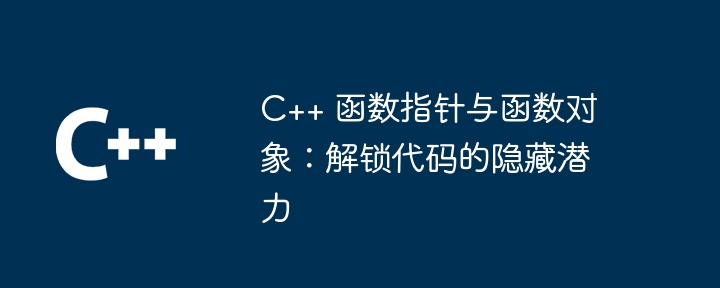Home >Backend Development >C++ >C++ Function Pointers vs. Function Objects: Unlocking the Hidden Potential of Your Code
C++ Function Pointers vs. Function Objects: Unlocking the Hidden Potential of Your Code
- 王林Original
- 2024-04-29 10:33:01774browse
C The function pointer points to the function, allowing the function to be called through the pointer. A function object is a class or structure that overloads the operator() operator and can be called like a function. They are useful when working with callback functions, which are functions that are passed to another function as arguments.

C Function Pointers and Function Objects: Unlocking the Hidden Potential of Your Code
Introduction
In C, Function pointers and function objects are powerful tools for representing and manipulating functions in code. Understanding these concepts is crucial as it can significantly improve the flexibility and maintainability of your code.
Function pointer
Function pointer is a pointer to a function. It stores the address of the function and allows you to call the function through a pointer. The syntax is as follows:
return_type (*function_pointer)(parameter1, parameter2, ...);
Example:
The following function calculates the sum of two numbers:
int add(int a, int b) {
return a + b;
}We can use the following function pointer to point to this function :
int (*add_ptr)(int, int) = add;
Now, we can call the add function through the function pointer:
int result = add_ptr(10, 20); // 等价于 add(10, 20)
Function object
The function object is a A type or structure that overloads the operator() operator so that it can be called like a function. The syntax is as follows:
struct FunctionObject {
return_type operator()(parameter1, parameter2, ...);
};Example:
We create a function object to calculate the sum of two numbers:
struct AddFunctionObject {
int operator()(int a, int b) {
return a + b;
}
};Now, we can instantiate This object and call it like a function:
AddFunctionObject add_object; int result = add_object(10, 20); // 等价于 add(10, 20)
Practical case: callback function
Function pointers and function objects are very useful when using callback functions. A callback function is a function that is passed to another function as a parameter.
Example:
Suppose we have a function that passes a set of numbers to another function. The latter performs operations on each number. We can pass the second function as a callback function using a function pointer or function object.
Use function pointer:
void process_numbers(int* numbers, int size, int (*operation)(int)) {
for (int i = 0; i < size; i++) {
numbers[i] = operation(numbers[i]);
}
}Use function object:
void process_numbers(int* numbers, int size, FunctionObject& operation) {
for (int i = 0; i < size; i++) {
numbers[i] = operation(numbers[i]);
}
}The above is the detailed content of C++ Function Pointers vs. Function Objects: Unlocking the Hidden Potential of Your Code. For more information, please follow other related articles on the PHP Chinese website!

